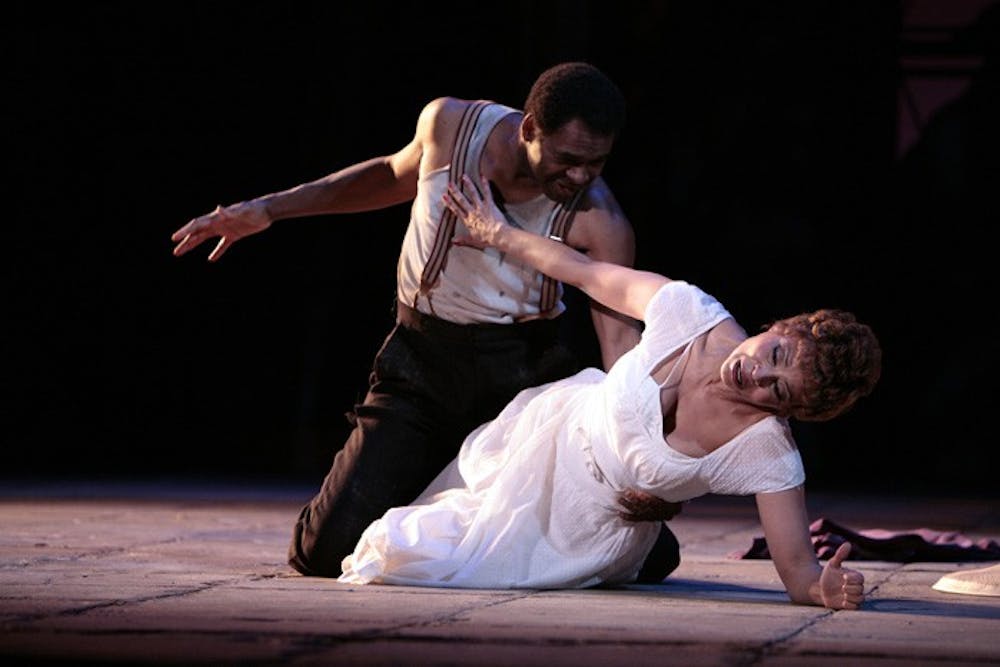The Kennedy Center’s Opera House was nearly filled. Opera-goers in various levels of finery waited patiently for the curtain to rise on the Washington National Opera’s latest production, “Porgy and Bess.” A degree of opening night excitement was in the air as well as a mix of apathy toward the production. This production of “Porgy” was on the Kennedy Center stage only five years ago, so most surprises were out of the question. The best a veteran audience member could hope for was perfect execution.
At the end of the performance, almost every person was on their feet, clapping and cheering. And if a production’s success can be measured by the size of the standing ovation, then “Porgy” is a hit.
Due to the recession — when the arts become a luxury — WNO’s current season is full of popular, standard operas to sell tickets and fill seats. This production of “Porgy” will do just that. The well-known opera could have resulted in a truly boring three hours, but instead the opera felt alive, warm and fresh.
“Porgy and Bess” is an American opera with music and lyrics by George and Ira Gerswhin, and libretto by DuBose Heyward, who wrote “Porgy,” the novel on which the opera is based.
“Porgy” has been controversial since its premiere in 1935. Set in Catfish Row, a fictional tenement in South Carolina, “Porgy” is the story of a community of impoverished African Americans. Through this prism, the audience sees the residents dealing with day-to-day life, drugs, religion, death and love.
The opera opens on Clara, the sweet wife to fisherman Jake, singing a lullaby to her baby. Enter Porgy, a crippled beggar, and Crown, a crude drunk, with his fast, loose woman, Bess. A fight breaks out between Crown and local man Robbins, resulting in the latter’s death. Crown flees town, and Bess moves in with Porgy. The rest of the opera deals with the fallout from this event.
Enough cannot be said of the sublime performances from the entire cast. As Porgy, Eric Owens is friendly yet strong with a booming bass-baritone voice. Owens’ Porgy is heartbreakingly convincing in his dedication to Bess.
Morenike Fadyomi, on the other hand, plays Bess with just the right amount of conflict as she struggles against her domestication from Crown’s “happy dust” addicted woman to Porgy’s respectable lady. Fadyomi commands the stage with her physical confidence and her electrifying voice.
When Owens and Fadyomi were together on stage (“Bess, You Is My Woman Now” and “I Loves You Porgy”), the scenes were honest and emotional. Both voices blended well together without either singer losing their sound.
In the role of Clara, Alyson Cambridge was tasked with singing the most well-known song from the opera, “Summertime.” Her rendition is both sweet and powerful, as was her portrayal of Clara.
The opera was full of high-register singing. Both Fadyomi and Cambridge, along with many of the woman of the chorus, made these money notes seem easy.
Perhaps the most crowd-pleasing performance came from Jermaine Smith in the role of Sportin’ Life — the “happy dust” dealer. Smith’s playful tenor voice, Michael Jackson-esque dance moves and minor acrobatics — including an in-air split — was a hit with the crowd.
Lisa Daltrius’ Serena — the Bible thumping matriarch of the community — had the stand-out performance of the evening. “My Man’s Gone Now” and “Oh, Doctor Jesus” were given the grace of an opera singer and a lot of gospel soul.
The supporting roles and entire ensemble should be commended for their performances. “Porgy” relied heavily on the other residents of Catfish Row to provide a living backdrop for the story.
(Please note: Most of the aforementioned principals are splitting the role and will not sing at each performance.)
Half-hearted physicality in some scenes was the production’s biggest problem. The fight between Crown and Robbins felt overly staged and anti-climatic. Later, when Crown and Bess are in an altercation, the crisis and panic is felt in the singer’s voices, but not in their actions.
The probability of the production’s success was almost definite. Director Francesca Zambello’s original 2005 production was a success. On top of that, many cast members, including Fadyomi, Cook and Smith, were in the original 2005 production while others have performed these roles with other companies in the United States.
The Gershwins are best known for their musical theater and jazz compositions. Many pop and jazz artists — including Billie Holiday, Nina Simone and Janis Joplin — have recorded the opera’s songs. Miles Davis recorded selections from the score for Columbia Records. Even Frank Sinatra sang a rendition of the “Porgy” aria “I Got Plenty o’ Nuttin.”
Unfamiliar audience members may cringe at the opera’s portrayal of African Americans, which has been characterized as racist, and dialogue laden with extra S’s on the end of words (“I Loves You Porgy”) and the grammatical errors (“Bess You Is My Woman Now”). But these elements also make “Porgy” a fascinating snapshot of American history.
Past the controversy was a nearly perfect production that, barring any real disasters, will receive standing ovations throughout its run.
AU students can purchase $25 tickets for the April 1 performance by going to www.dc-opera.org and using the source code, “American.”
You can reach this writer at thescene@theeagleonline.com.





